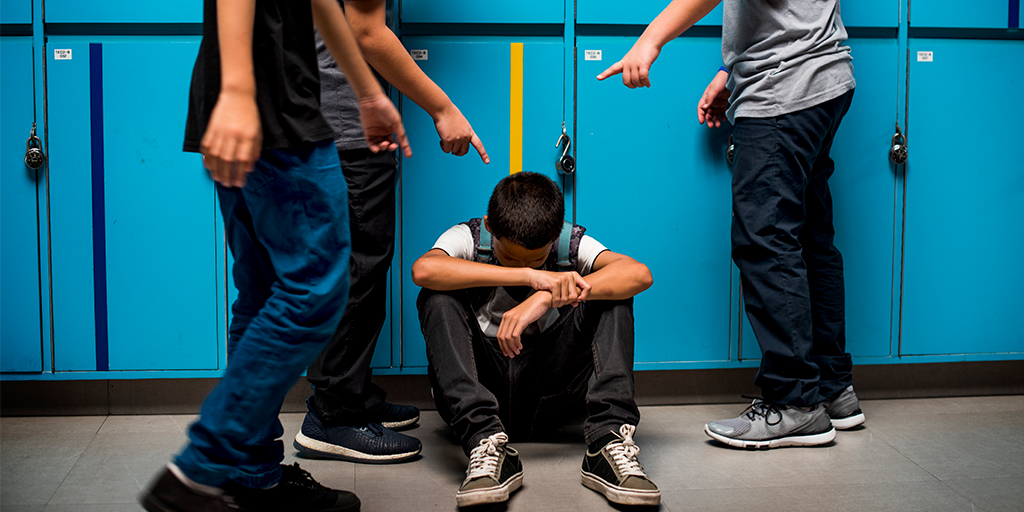For the longest time, there was a widespread belief that students in middle school could not be bullies. Nothing could be further from the truth. A group of students tends to have a de facto alpha of the group, be it male or female. On many occasions this alpha asserts his or her hold over the group by means of bullying or picking on other members of their clique.
While wrong, and something that needs to be actively discouraged, it takes concerted action, on the part of both the parents and the teachers to make sure this sort of behaviour does not become the norm. On other occasions, students with difficulty in connecting with other students often resort to verbal or physical violence to have their way. Sometimes there are occasions of kids bullying other children simply because they have been treated that way at home as well.
It is important to teach students the importance of not allowing bullies to have their way. This by extension, makes it important to help students identify what bullying is and how to deal with it. While École Mondiale World School has a zero-tolerance policy on bullying, we make sure that all our teachers, students and parents are aware of how they can identify bullying and what they can do about it.
Identifying Bullying
Most kids, at any given point of time, have been subjected to bullying - be it as a victim, a spectator or as a bully themselves. It could be someone on the playground, or an overly aggressive individual in the classroom, bullying is insidious in its presence where students are concerned. It all begins with teasing. Usually, teasing has its limits, but when it becomes unnecessarily hurtful, personal or physical it can very easily cross over into the territory of bullying.
Bullying is defined as intentional torment, physical, emotional or verbal. This can be done in a variety of ways, be it constant picking on someone, physical intimidation, name-calling, or even threats. There are also many cases of bullying by means of social ostracizing and even to the extent of spreading rumours about the individual.
When a child complains about being bullied at school, or at any other location, it is important to not ignore it. Most children do not talk about it and feel a misplaced sense of shame about this. In such cases it becomes the responsibility of the parent and the teachers to identify the source of the child’s discomfort and help them deal with it.
Encourage a child to talk about their day at school. Ask questions about the activities at school. If you find your child morose, uncommunicative, or troubled, make sure that you talk to him or their friends to understand the root of the problems. The most important thing here is to ensure that you have a healthy line of communication with the child.
Dealing with Bullying
Talk to Them
The best way to identify and deal with bullying is to be able to identify the warning signs. This begins with having open lines of communication with your child. Teach them the various ways bullying can happen. Verbal, physical, emotional or psychological, they need to be made aware of the ways they could be bullied if they are to successfully identify it.
Stay Calm
It never helps to get antagonised if someone is bullying your child. Stay calm, show the behaviour that you want your child to emulate. Deal with it on a rational level and escalate the problem to the concerned authorities and the parents of the perpetrator.
Teach Your Child to Take a Stand
It is important to teach your child the importance of taking a stand. Many a time they do not speak about what they are suffering simply because they do not want to be branded as tattletales. Teach them, in words and actions, the importance of taking a stand against bullies. There is a difference between being a doormat and being an instigator of a fight, teach your child the difference between the two.
Instil Confidence
Empower your child with confidence, it is their biggest defence against bullies. The most important thing to remember with bullies is that they cannot stand confidence. Boost your child’s confidence when they tell you how they diffused a situation. Tell them that their self-worth is not defined by the bully and is up to them instead.
There are a number of ways to ensure that your child is not affected by the sinister spectre of bullying. Inculcating the behaviour patterns that help a child deal with situations involving bullying is something that we pride ourselves at École Mondiale World School. A self-sufficient student is a student confident of his or her own abilities and someone who does not need to put others down to feel better about themselves.



_1757314019.png)
_1756547313.png)